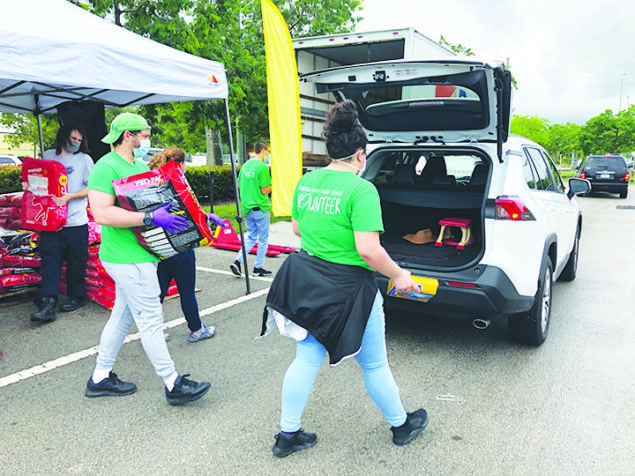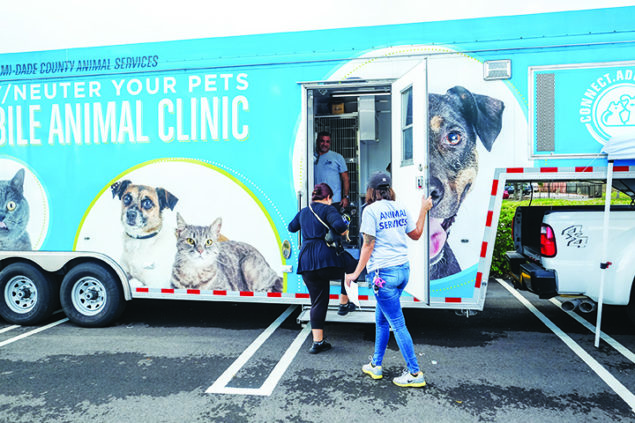|
Getting your Trinity Audio player ready...
|
A little TLC makes a huge difference in the lives of our furry friends at the Miami-Dade County Animal Services Department (Animal Services), but it takes more than food, water, play groups and walks from dedicated staff and volunteers to make a meaningful difference in the life of shelter pets at Animal Services’ Pet Adoption and Protection Center.
As an open-intake center that received more than 31,000 animals last year, it can be challenging to find the funds necessary to implement value-added programing. Initiatives that prevent admissions into the shelter, encourage adoption of senior animals and animals with medical needs, or even for enrichment items such as blankets and toys that help keep animals comfortable and entertained during their shelter stay, are critical to their care.
That’s where grant funding is vital. Grant funds help pay for programs and supplies that Animal Services’ budget can’t fund. Grants provide for more than everyday needs for shelter animals, pet owners, and the community. Since 2015, Animal Services has received more than $1.3 million in grant funding to develop programs that promote animal welfare.
One such program is the Trap-Neuter-Vaccinate-Return (TNVR) Program. Sources estimate that Miami-Dade County is home to between 300,000 and 400,000 community cats. The number of cats is an ever-growing problem with litters rapidly increasing the cat population.
Through a grant from the Best Friends Animal Society, Animal Services was able to better organize its community trapping efforts by implementing the Community Action Targeted Trapping Initiative (CATTI). CATTI has added a strategic element, drawing from the support of volunteer tappers, to enhance the effectiveness of the TNVR program. TNVR has contributed to a remarkable and consistent uptick in the cat save rate, which has improved drastically from 2011, when program activities began, to 2018. The save rate for cats has climbed from 25 percent in 2011 to 89 percent in 2018. This significant achievement has helped the department to exceed 90 percent overall save rate required to attain no-kill status since 2015.
As an additional benefit, spay and neuter surgeries provide health preserving and even behavioral benefits for dogs and cats alike. A no-cost spay neuter program is available for eligible low income residents. Subsidized through grants, the program provides accessibility to surgeries for pet owners that cannot otherwise afford them.
To be eligible for the program, pet owners must provide documented proof of participation in federal assistance programs such as food stamps, Medicaid, Supplemental Security Insurance (SSI), Temporary Assistance for Needy Families (TANF), and Jackson Health Card holders qualified as J02, J03 or J04.
Another group of animals that has benefited from grant support are senior animals and animals with medical needs that require frequent and costly veterinary services. These animals are often overlooked by potential adopters, who quickly assume they won’t be able to afford their care. Animal Services has three programs that were initiated as pilots through grant support.
The programs include the Expanded Safety Net Program, Support for Urgent Needs (SUN) and Incentivized Medical Program for Animal Care and Treatment (IMPACT). These programs provide stipends to qualified pet owners, rescues and adopters for critical medical services. The aim of the programs are to promote pet owners to remain with their animals during times of financial difficulty and encourage rescues and adopters to select senior and medically needy animals. Together, these programs have allowed hundreds of animals to receive a second chance at staying in, or finding, loving homes.
Some grants provide items for the comfort and joy of animals while in the shelter. These grants provide pet beds, toys and treats to help entertain, enrich and make the animals’ stay at the Pet Adoption and Protection Center more comfortable. These items go a long way in helping animals avoid developing behavioral issues that can hinder their chances of being adopted.
Finally, when unimaginable emergencies happen, grant funding also helps to make a difference not just for shelter pets, but also owned pets in the community.
During the COVID-19 pandemic, Animal Services received grant support of about $120,000 to purchase supplies that enabled shelter pets to be fostered during quarantine, as well as funding for basic pet needs. Pets of community residents financially affected by the pandemic received relief through Drive-Thru Pet Food Bank events and distribution of flea and tick prevention supplies, a necessity during Miami’s hot summer months when these pesky pests thrive. With the help of grants and philanthropic support, more than 250,000 pounds of pet food was distributed to more than 6,000 pet families in need. In addition, more than 1,600 pets received a three-month supply of flea and tick preventive. Most recently, a $50,000 grant was awarded from PetSmart Charities to help get community pets hurricane ready. Vaccine boosters, microchips and a supply kit are in the process of Animal Services receives grants from a variety of funders including the American Association for the Prevention of Cruelty to Animal (ASPCA), Best Friends Animal Society, Florida Animal Friends, Inc. (FAF), Friends of Miami Animals (FOMA), Maddie’s Fund, Petco Foundation, PetSmart Charities Inc., The Humane Society of the United States, and The Miami Foundation of Greater Miami. These grant funders depend on the generosity of their donors and/or customers to make grants possible for the optimal care of animal at local shelters.
The next time you’re picking up a bag of food or treat for your own furry friend, please consider opening your heart and wallet to give. Or, if you would like to donate directly to the lifesaving efforts at Animal Services, visit miamidade.gov/animals. Even the smallest donation goes a long way in helping to make grant funding possible for programs that have a lasting impact on homeless animals.







